
ANGIOGENESIS
Scope & Guideline
Advancing Knowledge in Tumor Biology and Tissue Regeneration
Introduction
Aims and Scopes
- Molecular Mechanisms of Angiogenesis:
Research that elucidates the molecular pathways and signaling cascades involved in angiogenesis, including factors like VEGF, angiopoietins, and various growth factors. - Endothelial Cell Biology:
Studies focusing on endothelial cell function, plasticity, and interactions in health and disease, particularly in the context of vascular development and pathology. - Pathological Angiogenesis:
Exploration of abnormal angiogenesis in diseases such as cancer, diabetic retinopathy, and hereditary hemorrhagic telangiectasia, highlighting potential therapeutic targets. - Vascular Development and Regeneration:
Research on the processes of vasculogenesis and angiogenesis during development and tissue repair, including the role of stem cells and tissue engineering. - Clinical Applications and Therapeutics:
Studies that translate basic research findings into clinical applications, focusing on novel therapies for conditions associated with aberrant angiogenesis. - Inflammation and Angiogenesis:
Investigations into how inflammatory processes influence angiogenic responses, particularly in the context of chronic diseases and infections.
Trending and Emerging
- Angiogenesis in COVID-19 and Post-Viral Syndromes:
Research addressing the role of angiogenesis in COVID-19 and its long-term effects, including complications like post-COVID syndrome and microvascular dysfunction. - Mitochondrial Dysfunction and Angiogenesis:
An increasing number of studies are exploring the interplay between mitochondrial function and angiogenesis, particularly in pathological conditions such as diabetic retinopathy. - Utilization of iPSC-Derived Endothelial Cells:
The use of induced pluripotent stem cells (iPSCs) to study endothelial cell behavior and disease mechanisms is gaining momentum, providing insights into vascular development and regeneration. - Role of Extracellular Vesicles in Angiogenesis:
Emerging research on the role of extracellular vesicles and small RNAs in modulating angiogenic processes, particularly in cancer and inflammatory diseases. - Mechanobiology of Endothelial Cells:
A growing interest in how mechanical forces and the physical properties of the vascular microenvironment influence endothelial cell behavior and angiogenesis. - Targeted Therapeutics in Cancer Angiogenesis:
A trend towards the development of targeted therapies that specifically inhibit angiogenesis in tumor microenvironments, reflecting the need for precision medicine in oncology.
Declining or Waning
- Traditional Angiogenesis Models:
There has been a noticeable decrease in studies relying solely on classical in vitro angiogenesis assays, as newer technologies and models like organ-on-a-chip systems gain traction. - Generalized Anti-Angiogenic Therapies:
Research focusing on broad-spectrum anti-angiogenic therapies has waned, with a shift towards more targeted and personalized approaches in specific diseases. - Static Analysis of Endothelial Cells:
The focus on static, non-dynamic analyses of endothelial cells has declined, giving way to more dynamic studies that incorporate mechanical forces and cellular interactions. - Non-Specific Biomarker Studies:
There has been a reduction in publications centered on generic biomarkers for angiogenesis, as more specific and mechanistic approaches are favored. - Angiogenesis in Non-Pathological Contexts:
Less emphasis is placed on studying angiogenesis in normal physiological contexts, with a stronger focus on pathological conditions and their therapeutic implications.
Similar Journals

CELL AND TISSUE RESEARCH
Advancing the Frontiers of Cell Biology and Tissue DynamicsCELL AND TISSUE RESEARCH, published by Springer, is a premier journal dedicated to advancing the field of cell biology, histology, pathology, and forensic medicine. With a proud history dating back to its foundation in 1924 and continuing its legacy, this journal has established itself as a vital source for innovative research, facilitating the dissemination of significant findings that contribute to the understanding of cellular and tissue dynamics. Hailing from Germany, the journal exhibits an impressive standing in the academic community with a 2023 impact factor reflected in its category quartiles: Q2 in Cell Biology, Q1 in Histology, and Q1 in Pathology and Forensic Medicine. It ranks notably within multiple Scopus categories, including 32/208 in Pathology and Forensic Medicine and 13/62 in Histology, showcasing its high percentile rankings of 84th and 79th, respectively. Researchers, professionals, and students benefit from its extensive coverage and rigorous peer-review process that ensures the integrity and relevance of its published works, thus making it an essential resource in the scientific community. While it operates under a subscription model, its commitment to quality and impact makes it an indispensable journal for anyone engaged in cellular and tissue research.

Journal of Developmental Biology
Bridging Knowledge Across Biological SystemsJournal of Developmental Biology, published by MDPI, is an esteemed open access journal that has been contributing to the field since its inception in 2013. With a focus on developmental processes across various biological systems, this journal serves as a vital platform for disseminating cutting-edge research and fostering dialogue among experts in the fields of Cell Biology, Developmental Biology, and Molecular Biology. The journal currently holds a commendable Q2 ranking in both Developmental Biology and Molecular Biology, underscoring its significance in advancing knowledge within these domains. Operating out of Switzerland, and featuring an engaging array of articles, the journal prioritizes accessibility through its Open Access model, further expanding the reach of vital research findings. Whether you are a seasoned researcher or an enthusiastic student, the Journal of Developmental Biology provides an essential resource for the latest insights and developments in this rapidly evolving field.

Frontiers in Cell and Developmental Biology
Advancing the frontiers of cellular knowledge.Frontiers in Cell and Developmental Biology is a leading open-access journal published by FRONTIERS MEDIA SA, dedicated to advancing the understanding of fundamental biological processes at the cellular and developmental levels. Since its inception in 2013, the journal has positioned itself as a cornerstone of research in its field, achieving esteemed Q1 quartile rankings in both Cell Biology and Developmental Biology for 2023. With a robust Scopus ranking of #13 out of 82 in Developmental Biology and #67 out of 285 in Cell Biology, it represents a vital platform for innovative research and scholarly discourse. The journal provides a comprehensive and accessible avenue for researchers, professionals, and students alike to share high-quality findings and insights into cellular mechanisms and developmental processes, fostering collaboration and knowledge exchange in the global scientific community. Based in Lausanne, Switzerland, Frontiers in Cell and Developmental Biology is committed to open science, ensuring that all articles are freely accessible to the public, thereby broadening the impact of research in the biological sciences.
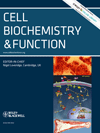
CELL BIOCHEMISTRY AND FUNCTION
Illuminating the Pathways of Life at the Cellular LevelCELL BIOCHEMISTRY AND FUNCTION is a prominent journal dedicated to disseminating high-quality research in the fields of biochemistry, cell biology, and clinical biochemistry. Published by Wiley, this journal has maintained an esteemed reputation since its inception in 1983, bridging decades of scientific advancements and contributions until 2024. With ISSN 0263-6484 and E-ISSN 1099-0844, it serves as a vital resource for researchers, professionals, and students. The journal is classified in quartiles Q2 and Q3 across various categories in the 2023 rankings, showcasing its impact and significance within the academic community. Highlighting essential studies in medicinal biochemistry and cellular functionalities, CELL BIOCHEMISTRY AND FUNCTION not only presents cutting-edge research but also encourages interdisciplinary collaboration, thereby advancing the understanding of biochemical processes that underlie living systems. With no open access currently available, readers are encouraged to access articles through institutional subscriptions or individual purchases, ensuring exclusive engagement with the latest scientific findings in this dynamic field.
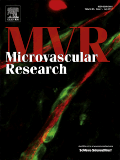
MICROVASCULAR RESEARCH
Elevating the Study of Microvascular Function and DiseaseMicrovascular Research is a prominent journal dedicated to advancing the understanding of microvascular biology and its implications in various health and disease contexts. Published by Academic Press Inc elsevier Science, this journal holds a significant place in the academic community with an impact factor reflecting its high citation frequency and relevance within its fields. With a Q2 ranking in both Biochemistry and Cardiology and Cardiovascular Medicine, as well as a Q3 ranking in Cell Biology, it provides an essential platform for researchers and professionals to publish and access groundbreaking studies. Established in 1968 and running through to 2025, Microvascular Research covers a broad scope, focusing on various topics related to microvessels and their functions, emphasizing the importance of these structures in health and pathology. Although the journal does not offer open access, it remains a vital resource for those seeking to deepen their understanding of microvascular dynamics, making it an essential addition to the libraries of researchers, clinicians, and students alike.
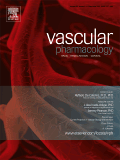
VASCULAR PHARMACOLOGY
Connecting research and practice in vascular medicine.Vascular Pharmacology, published by Elsevier Science Inc, is a leading journal in the fields of pharmacology and molecular medicine, dedicated to advancing our understanding of vascular biology and therapeutic interventions. With an impressive impact factor reflecting its significant contribution to the scientific community, this journal seeks to publish ground-breaking research that elucidates the molecular mechanisms underlying vascular function and disease, as well as the pharmacological impact of new therapeutic agents. The journal operates under a dual access model, allowing for both subscription and open access options, ensuring that vital research is accessible to a wide audience. As of 2023, it holds a prestigious position in the Q1 category for pharmacology and ranks well in molecular medicine and physiology, reflecting its high quality and relevance. Whether you are a researcher, clinician, or student, Vascular Pharmacology serves as an essential resource to stay at the forefront of cardiovascular pharmacotherapy and vascular biology.

ARTERIOSCLEROSIS THROMBOSIS AND VASCULAR BIOLOGY
Transforming cardiovascular health through impactful discoveries.ARTERIOSCLEROSIS THROMBOSIS AND VASCULAR BIOLOGY, published by Lippincott Williams & Wilkins, is a leading journal in the field of cardiovascular medicine, dedicated to the advancement of research surrounding arterial diseases, thrombosis, and vascular biology. With an impressive impact factor indicative of its reach and influence, this journal occupies a prominent position in the Q1 category of cardiology, ranking 13th out of 387 in its field according to Scopus, placing it within the top 96th percentile among cardiovascular research journals. Since its inception in 1990, ARTERIOSCLEROSIS THROMBOSIS AND VASCULAR BIOLOGY has been pivotal in disseminating cutting-edge research that drives innovation and education in cardiovascular health. Although it does not operate under an open access model, the journal is a vital resource for researchers, clinicians, and students looking for high-quality, peer-reviewed articles that contribute to the understanding and treatment of cardiovascular and vascular disorders. Its commitment to rigorous scientific standards and its focus on impactful findings make it an essential publication for anyone dedicated to the field.
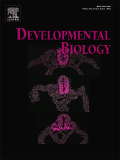
DEVELOPMENTAL BIOLOGY
Charting New Territories in Developmental StudiesDEVELOPMENTAL BIOLOGY, published by Academic Press Inc., Elsevier Science, stands as a pivotal journal in the fields of cell biology, developmental biology, and molecular biology since its inception in 1959. Renowned for its rigorous peer-review process, this journal serves as a platform for publishing cutting-edge research, reviews, and insights that drive forward our understanding of developmental processes at the cellular and molecular levels. With an impressive track record, it is classified in the Q2 quartile across multiple categories, reflecting its significant impact and relevance in academia and research communities. Although the journal does not provide Open Access options, it remains accessible via numerous academic databases, ensuring a wide reach for researchers, professionals, and students alike. With a commitment to advancing the field, DEVELOPMENTAL BIOLOGY continues to be essential reading for those looking to stay at the forefront of developmental research and its applications.

JOURNAL OF MOLECULAR HISTOLOGY
Pioneering the intersection of science and medicine.The Journal of Molecular Histology, published by Springer, stands at the forefront of multidisciplinary research in cellular and molecular histology, offering vital contributions in the fields of Cell Biology, Histology, and Medicine. With an ISSN of 1567-2379 and an E-ISSN of 1567-2387, this peer-reviewed journal has maintained its commitment to advancing knowledge since its inception in 2004 and continues to thrive into 2024. The journal, located in The Netherlands, boasts a robust impact within its categories, currently holding Q3 rankings in Cell Biology and Q2 rankings in Histology, Medicine, and Physiology, highlighting its relevance to academics and professionals alike. With Scopus rankings that reflect a strong percentile presence across multiple fields, the journal emphasizes open access options to enhance the dissemination of critical research findings. As a valuable resource for researchers, professionals, and students engaged in molecular exploration, the Journal of Molecular Histology fosters innovation and collaboration, making significant impacts on our understanding of tissue structure and function.
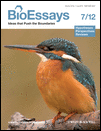
BIOESSAYS
Elevating Knowledge in the Life SciencesBIOESSAYS, published by WILEY, is a leading academic journal dedicated to the dynamic fields of biochemistry, genetics, and molecular biology. With an impressive impact factor and recognized as a Q1 journal in its category for 2023, it ranks 49 out of 221 in the Scopus database, placing it within the 78th percentile among its peers. Since its inception in 1984, BIOESSAYS has served as a vital platform for researchers, professionals, and students, facilitating the dissemination of pivotal findings, innovative theories, and review articles that shape the current understanding of biological sciences. Although it does not offer open access, the journal remains key for those seeking to stay at the forefront of scientific discovery and discussion within this ever-evolving discipline. With its commitment to high-quality, peer-reviewed content, BIOESSAYS continues to influence future research directions and academic discourse.